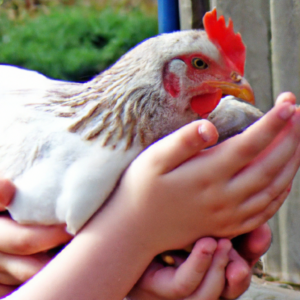
Have you ever wondered how to prevent your chickens from eating their own eggs? It can be frustrating and costly, not to mention it robs you of those delicious fresh eggs. But fear not, there are solutions to this common problem. In this article, we will explore the various methods you can employ to deter egg-eating behavior in your chickens, ensuring that they lay their eggs for you to enjoy, rather than devouring them themselves. So, if you’re ready to put an end to this pesky behavior and reclaim your eggs, let’s get started!
Provide Adequate Nesting Boxes
Make sure there are enough nesting boxes
When it comes to preventing egg-eating behavior in chickens, providing adequate nesting boxes is crucial. A general rule of thumb is to have one nesting box for every four to five hens. This ensures that each hen has her own space to lay eggs comfortably and reduces the chances of one hen becoming territorial over the nesting area, which can trigger egg-eating behaviors. By providing enough nesting boxes, you create a more peaceful and stress-free environment for your chickens.
Ensure nest boxes are dark and comfortable
Chickens prefer dark and cozy environments for laying their eggs. By making sure the nest boxes are dark and comfortable, you can discourage egg-eating behavior. Consider using curtains or dividers to create a sense of privacy inside the nesting boxes. This helps to mimic the natural nesting conditions that chickens seek in the wild, making them feel secure and less likely to engage in destructive behaviors like egg eating.
Collect Eggs Frequently
Collect eggs at least twice daily
Regular egg collection is essential to discourage egg-eating behavior. Make it a habit to collect eggs at least twice daily to prevent them from piling up in the nest boxes. When eggs accumulate, they become more tempting for chickens to investigate and potentially eat. By collecting eggs frequently, you ensure that they are removed from the coop as soon as possible, reducing the opportunity for chickens to develop a taste for them.
Remove any broken eggs immediately
Broken eggs can be a tempting treat for chickens and can also lead to egg-eating behavior. When an egg is broken in the coop, the strong smell can entice the chickens to peck at it, leading to a habit of egg-eating. To prevent this, it is crucial to remove any broken eggs immediately. Regularly check the nesting boxes to identify and remove damaged eggs before they become a source of attraction for your chickens.
Use Fake or Ceramic Eggs
Place fake or ceramic eggs in the nesting boxes
One effective method to deter egg eating is by placing fake or ceramic eggs in the nesting boxes. Chickens are curious creatures, and when they encounter a hard object resembling an egg, they tend to peck at it to investigate. By placing fake or ceramic eggs in the nesting boxes, your chickens will peck at the impostors and eventually lose interest in real eggs. This method tricks their instinctual behavior, minimizing the chances of egg-eating habits developing.
Chickens will peck at the hard eggs and lose interest in real eggs
Chickens are naturally drawn to peck at objects, especially those that resemble eggs. By providing fake or ceramic eggs, you redirect their pecking behavior away from real eggs. Chickens quickly learn that pecking at these hard objects does not produce any reward, discouraging them from pecking and potentially breaking their own eggs. The key is consistency, ensuring that fake or ceramic eggs are consistently present in the nesting boxes to maintain the deterrent effect.
Reduce Boredom and Stress
Provide ample space for chickens to roam
Boredom and stress can often lead to destructive behaviors in chickens, including egg-eating. To prevent this, provide ample space for your chickens to roam freely. Encourage them to forage and explore their surroundings, whether through free-ranging or by creating a spacious chicken run. Increased mobility and mental stimulation help keep your chickens engaged and less likely to resort to destructive habits like egg-eating.
Include environmental enrichments like perches and dust baths
Environmental enrichments play a vital role in keeping chickens mentally stimulated and stress-free. Incorporate items such as perches and dust baths into the chicken coop or run. Perches provide chickens with a place to rest and observe their surroundings, mimicking their natural roosting behaviors. Dust baths create opportunities for chickens to engage in natural grooming rituals, which can have a calming effect. By providing these enrichments, you create a more fulfilling environment for your chickens, reducing the likelihood of egg-eating behavior.
Address Nutritional Deficiencies
Ensure chickens have a balanced diet
Nutritional deficiencies can contribute to egg-eating behavior, as chickens may attempt to compensate for the lack of essential nutrients by consuming their own eggs. It is crucial to provide your chickens with a balanced diet that meets their nutritional requirements. High-quality poultry feed, supplemented with fresh fruits, vegetables, and occasional treats, helps ensure that your chickens receive the necessary nutrients to maintain their overall health and well-being.
Consult a veterinarian about necessary supplements
In some cases, certain breeds or individual chickens may require additional supplements to address specific nutritional deficiencies. If you suspect that your chickens are prone to egg-eating due to a lack of certain nutrients, it is advisable to consult a veterinarian experienced in poultry health. They can assess your flock’s nutritional needs and recommend appropriate supplements if necessary. By addressing any deficiencies, you can help diminish the chances of egg-eating behavior occurring.
Improve Calcium Intake
Offer oyster shells or crushed eggshells in a separate container
Insufficient calcium levels in a chicken’s diet can contribute to egg-eating behavior. One effective way to counter this is by offering oyster shells or crushed eggshells in a separate container within the coop. Calcium-rich supplements are essential for proper egg development, and by providing them separately, you ensure that chickens have easy access to the calcium they need without resorting to consuming their own eggs. This helps maintain a balanced diet and reduces the likelihood of egg-eating habits.
Adding calcium to the diet can decrease egg-eating behavior
Calcium is a vital nutrient for chickens, especially those that lay eggs regularly. By adding calcium-rich supplements like oyster shells or crushed eggshells to their diet, you can help fulfill their calcium requirements. When chickens have an adequate supply of calcium, they are less likely to resort to eating their own eggs. This simple dietary adjustment can have a significant impact on reducing egg-eating behavior and promoting overall well-being in your flock.
Adjust Lighting Conditions
Provide adequate lighting in the coop
Lighting conditions play an important role in regulating chickens’ natural behaviors, including egg-laying. It is important to provide adequate lighting in the coop to help establish consistent routines for your chickens. Bright, well-lit environments mimic natural daylight cycles, signaling to the hens when it is appropriate to lay eggs. By ensuring proper lighting, you help maintain a sense of order in your flock, reducing stress and the chances of egg-eating behavior.
Avoid sudden changes in lighting conditions
Sudden changes in lighting conditions can disrupt a chicken’s natural rhythms and lead to stress or confusion. This can potentially trigger egg-eating behavior as a response to environmental uncertainty. To avoid this, make any lighting adjustments gradual and avoid abrupt changes that may confuse your flock. Gradually increasing or decreasing the duration of light exposure in the coop can help maintain stability and minimize the possibility of undesirable behaviors like egg-eating.
Manage Broody Behavior
Identify and manage broody behavior in chickens
Broody behavior in chickens refers to a natural instinct to incubate eggs. While broody hens are an essential part of a flock’s reproductive process, excessive or prolonged broodiness can contribute to egg-eating behavior. It is important to identify and manage broody behavior in your chickens to minimize the risk of egg consumption. If you notice a hen exhibiting broody behaviors such as constantly sitting on eggs, refusing to leave the nesting box, or becoming aggressive towards other chickens, it may be necessary to intervene and break her broodiness.
Remove broody hens from the coop to prevent egg-eating
If a hen’s broody behavior becomes disruptive or leads to egg-eating tendencies, it may be necessary to remove her from the coop temporarily. Isolating the broody hen in a separate area that lacks nesting materials and is well-ventilated can help break her broodiness and discourage egg-eating behavior. This separation allows her to adjust her hormones and redirect her focus away from nest incubation. Once she has returned to her normal behavior, she can be reintegrated with the rest of the flock.
Establish a Peaceful Environment
Reducing aggression among chickens can decrease egg-eating behavior
Aggressive behaviors within a flock can contribute to stress and anxiety among chickens. Such negative dynamics can lead to destructive behaviors like egg-eating. To create a peaceful environment, it is important to address any aggression issues among your chickens. Ensure that there is enough space for all chickens and provide separate feeding and watering areas to minimize competition and reduce potential triggers for aggressive behavior. By fostering a harmonious and calm environment, you can significantly decrease the chances of your chickens engaging in egg-eating.
Provide separate feeding and watering areas
Separate feeding and watering areas are essential in preventing aggression and dominance behaviors among chickens. When chickens have access to their own food and water sources, they are less likely to feel the need to fight for resources, reducing overall stress levels and the likelihood of destructive behaviors like egg-eating. Whether by using multiple feeding troughs or keeping separate stations in different areas of the coop or run, providing individual access to food and water promotes a more peaceful coexistence.
Implement Punishment Techniques
Consider using a chicken wire cone around the neck of an egg-eating chicken
As a last resort, punishment techniques can be utilized to deter egg-eating behavior in chickens. One such technique involves using a chicken wire cone placed around the neck of an egg-eating chicken. The discomfort caused by the cone can discourage further attempts to reach and consume eggs. However, it is essential to remember that punishment should only be used sparingly and as a temporary solution. It is crucial to address the underlying reasons for egg-eating behavior rather than relying solely on punishment.
The discomfort will discourage further egg-eating
The chicken wire cone restricts the ability of the chicken to access her eggs, making it uncomfortable and frustrating for her. This unpleasant experience can serve as a deterrent, discouraging future attempts of egg consumption. By associating the discomfort with the act of eating eggs, the chicken begins to associate her own negative experience with the behavior, reducing the likelihood of egg-eating in the future. It is important to observe the chicken closely and remove the cone once she has learned her lesson to avoid unnecessary distress.







